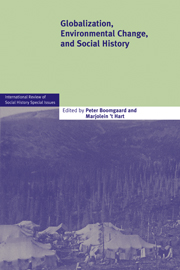Book contents
- Frontmatter
- Contents
- Notes on Contributors
- Globalization, Environmental Change, and Social History: An Introduction
- The El Dorado of Forestry: The Eucalyptus in India, South Africa, and Thailand, 1850–2000
- The Mid-Atlantic Islands: A Theatre of Early Modern Ecocide?
- Environmental Change and Globalization in Seventeenth-Century France: Dutch Traders and the Draining of French Wetlands (Arles, Petit Poitou)
- The Colonial Famine Plot: Slavery, Free Trade, and Empire in the French Atlantic, 1763–1791
- Environmental Changes, the Emergence of a Fuel Market, and the Working Conditions of Salt Makers in Bengal, c. 1780–1845
- Industrial Life in a Limiting Landscape: An Environmental Interpretation of Stalinist Social Conditions in the Far North
- “Pumpkins Just Got in There”: Gender and Generational Conflict and “Improved” Agriculture in Colonial Zimbabwe
- Hydro-businesses: National and Global Demands on the São Francisco River Basin Environment of Brazil
- Bibliography
Hydro-businesses: National and Global Demands on the São Francisco River Basin Environment of Brazil
Published online by Cambridge University Press: 05 June 2012
- Frontmatter
- Contents
- Notes on Contributors
- Globalization, Environmental Change, and Social History: An Introduction
- The El Dorado of Forestry: The Eucalyptus in India, South Africa, and Thailand, 1850–2000
- The Mid-Atlantic Islands: A Theatre of Early Modern Ecocide?
- Environmental Change and Globalization in Seventeenth-Century France: Dutch Traders and the Draining of French Wetlands (Arles, Petit Poitou)
- The Colonial Famine Plot: Slavery, Free Trade, and Empire in the French Atlantic, 1763–1791
- Environmental Changes, the Emergence of a Fuel Market, and the Working Conditions of Salt Makers in Bengal, c. 1780–1845
- Industrial Life in a Limiting Landscape: An Environmental Interpretation of Stalinist Social Conditions in the Far North
- “Pumpkins Just Got in There”: Gender and Generational Conflict and “Improved” Agriculture in Colonial Zimbabwe
- Hydro-businesses: National and Global Demands on the São Francisco River Basin Environment of Brazil
- Bibliography
Summary
Summary: The São Francisco River provided very obvious, close-by forms of sustenance for local communities. Beginning in the mid-1950s, the river became the place for large hydro-electric facilities, large-scale flooding, and population resettlement. A decade later, the federal government began working on pilot irrigation projects that would lead to areas described today as the Brazilian California. Hydro-power for Brazilian cities such as Recife and Salvador and irrigation for grapes and mangoes destined for the United States and Europe are among the eco-system services this river supplies. The purpose of federal policies for the north-east went beyond mitigation of the consequences of droughts, the hydraulic approach, and started to follow an economic approach based upon development; as a consequence, river and user came to be distant from one another. The two major intensive uses of the river, electricity and irrigation, threaten the long-term sustainability of this system.
INTRODUCTION
“[U]nder natural conditions nothing is ever just right: it is always too big or too little, too steep or too flat, too hot or too cold, too wet or too dry.” The human use of the water resources of the São Francisco River (SFR) has long shaped the environment of the basin and of cities and towns along its course. The phrase quoted above was heard by an early sanitary engineer and environmentalist, the American Herman Baity, while working on improvements in water and sanitation access in the north-east of Brazil. The thought justified the transformation of nature pushed by the national elites from 1950s onward.
- Type
- Chapter
- Information
- Globalization, Environmental Change, and Social History , pp. 203 - 234Publisher: Cambridge University PressPrint publication year: 2011



